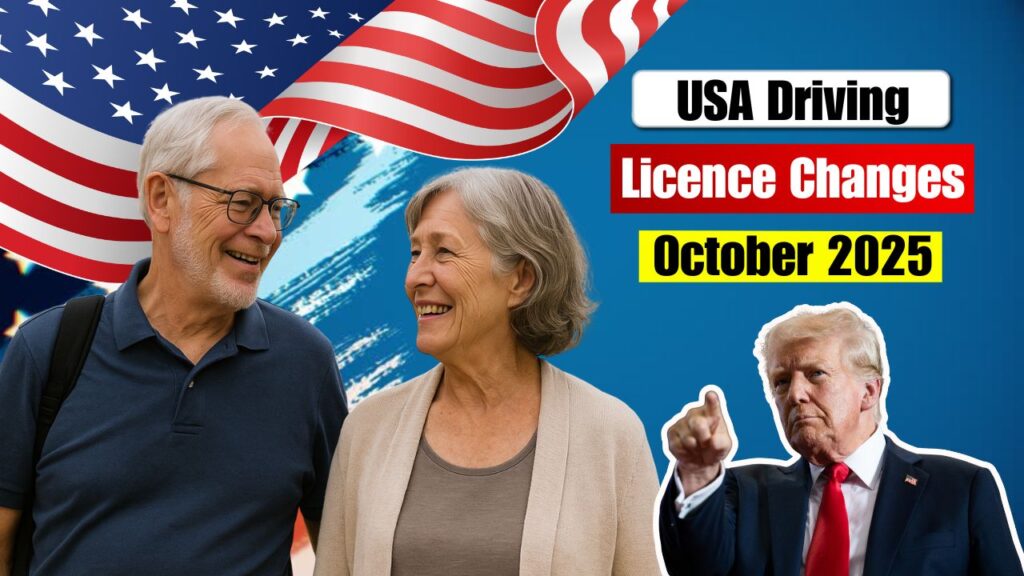The United States is set to roll out major driving license rule changes in October 2025, and these updates will particularly affect senior citizens. The new rules aim to improve road safety while simplifying renewals and ensuring drivers remain medically and cognitively fit. Seniors aged 65 and above will see new requirements for vision testing and documentation at renewal. Authorities have confirmed that digital licenses and online renewals will also become more accessible, making it easier for older drivers to stay compliant without long wait times at the DMV.

New Driving License Requirements for Seniors
From October 2025, the Department of Motor Vehicles (DMV) across U.S. states will implement uniform rules to help improve driver safety among older citizens. Seniors will now have to undergo vision and health tests more frequently to ensure they are fit to drive. For drivers aged 70 and above, license renewal will now be required every three years instead of every five. The goal is to identify potential medical issues early, such as deteriorating eyesight or slower reaction times, while maintaining road safety standards for everyone.
Introduction of Digital and Remote Renewal Options
The October 2025 update also introduces new digital license renewal options for eligible seniors. Those with clean driving records can complete their renewal online or via mobile app, avoiding in-person visits altogether. This modernization of the DMV process is designed to make the system more accessible and convenient for older Americans. Seniors who face difficulties traveling or standing in long queues can now renew from home, upload health certificates digitally, and receive their digital license ID via email within days.
Also Check – New Road Rule for US Seniors Aged 70 Plus Effective from October 2025 – Licence Renewal Triggers, Eyesight Thresholds
Medical and Vision Test Guidelines
Under the new regulations, medical clearance becomes a mandatory requirement for certain age groups. Drivers over 75 will need to submit a doctor’s certificate confirming they are fit to drive. Additionally, vision tests will be required at each renewal for anyone aged 65 or older. States like California, Texas, and Florida are already adapting to these federal recommendations. This ensures that seniors remain active and mobile, but with adequate safety checks in place to reduce accident risks caused by health issues or slow reflexes.
Impact of the New Rules on Senior Drivers
The 2025 rule changes have been welcomed by many as a step toward better safety and modernization. However, some seniors have expressed concerns about the increased medical documentation burden. Experts believe that these rules strike a balance between protecting elderly independence and ensuring public safety. With improved digital tools, many seniors will actually find the renewal process faster and more transparent than before. The government is also planning awareness drives to educate older citizens about how to comply easily with the license update process.
| Age Group | Renewal Period | Medical Test Required | Vision Test Required | Renewal Option |
|---|---|---|---|---|
| Below 65 years | Every 8 years | No | Optional | In-person or online |
| 65–69 years | Every 5 years | No | Yes | In-person or online |
| 70–74 years | Every 3 years | Optional | Yes | In-person or digital |
| 75+ years | Every 2 years | Yes | Yes | In-person or assisted online |
Also See – COLA 2026 in the United States – Who Gains More Women or Men and Benefit Increases Survivor Rules
FAQ 1: When do the new rules start?
The new driving license rules will take effect from October 2025 across all U.S. states.
FAQ 2: Do seniors need a medical certificate?
Yes, drivers aged 75 and above must submit a valid medical certificate at each renewal.
FAQ 3: Can I renew my license online?
Yes, eligible seniors with no record violations can renew digitally through the DMV portal.
FAQ 4: Will there be extra fees for older drivers?
No, the government has confirmed that renewal fees will remain the same for all age groups.




